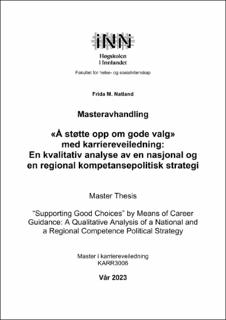| dc.contributor.advisor | | |
| dc.contributor.author | Natland, Frida M. | |
| dc.date.accessioned | 2023-07-06T16:10:36Z | |
| dc.date.available | 2023-07-06T16:10:36Z | |
| dc.date.issued | 2023 | |
| dc.identifier | no.inn:inspera:148101317:51354277 | |
| dc.identifier.uri | https://hdl.handle.net/11250/3076699 | |
| dc.description.abstract | Dette masterprosjektet er en kvalitativ tekstanalyse av Nasjonal kompetansepolitisk strategi 2017-2021 og Kompetansestrategi for Trøndelag. Målet er å finne ut hvilke forventninger til min karriereveiledningspraksis som kan skapes gjennom fremstillinger av mennesker, samfunn og karriereveiledning i strategiene. Prosjektet er vitenskapsteoretisk fundamentert i hermeneutikk og konstruktivistisk interaksjonisme. Ved bruk av en kvalitativ innholdsanalyse beskrives fremstillinger av samfunnet, individet, grupper og karriereveiledning.
Funnene viser at fremstillinger av samfunnet handler om raske endringer, omstilling og kompetansebehov, konkurranse, effektivitet og produktivitet. Det finnes også en vektlegging av velferd, bærekraft, og den norske arbeidslivsmodellen. Samfunn og arbeidsliv er fremstilt som en objektiv virkelighet som menneskene er nødt til å tilpasse seg. Individ og grupper fremstilles som at man må ha nok og riktig kompetanse for arbeidslivet, og evne til å omstille seg i takt med samfunn og arbeidsliv. Enkeltmennesker og grupper er ofte fremstilt som ansvarlige for å tilegne seg og ha riktig og nok kompetanse for å delta i arbeidslivet. Disse fremstillingene varierer imidlertid noen steder, ved anerkjennelse av strukturer som begrensende for enkeltmennesker og grupper, og ved hvor ansvaret plasseres.
Karriereveiledning fremstilles ganske likt i strategiene. Jeg mener dette tydeliggjør hva som er forventet av karriereveiledningen: Å bidra til at befolkningen er omstillingsdyktige og tar «gode» valg ved å imøtekomme arbeidslivets kompetansebehov.
Jeg argumenterer for at funnene understreker viktigheten av en etisk bevissthet i praksisfeltet. Verdigrunnlaget og de etiske retningslinjene i Nasjonalt kvalitetsrammeverk for karriereveiledning kan fungere som en støtte for karriereveiledere i møte med slike forventninger. Jeg mener imidlertid det kan være nødvendig at karriereveilederens etiske forpliktelser i større grad blir kjent også utenfor praksisfeltet. Dette kan kanskje forebygge at man i fremtiden blir stilt overfor forventninger som utfordrer verdigrunnlaget. | |
| dc.description.abstract | This Master Thesis is a Qualitative Text Analysis of The National Competence- Policy Strategy 2017- 2021 and The Competence Strategy for Trøndelag. The goal here is to find out what expectations are created towards my career guidance praxis, through the conceptions of people, communities, and career guidance in these strategies. The project is founded in the science of Hermeneutics and Constructivist Interactionism. Conceptions of the society, the individual, groups of individuals, and career guidance, are described in this thesis by the way of a qualitative content analysis.
The research findings in this thesis show that conceptions of the society is all about fast changes, restructuring and the needs for competences, competition, efficiency and productivity. There is also a focus on welfare, sustainibility, and the Norwegian Working Life Model. Society and the working life are often portrayed as an objective reality to which people have to adapt. It is portrayed that individuals and groups need to have the correct and necessary skills required in the working life, as well as the abilities to change in accordance with society and the labor market. The wording used in the strategies in question often implies that it is the responsibility of individuals and groups to have the required skills to be a part of the work force. The conceptions of individuals and groups varies to some degree throughout and between the strategies: in recognizing structures as limiting to individuals and groups, and where to place the responsibility in question.
Career guidance is portrayed in mostly the same ways throughout the strategies. It is my opinion that this clarifies what is expected of career guidance services: To contribute to helping the population adapt and make «good» choices in the way of meeting the skills requirements of the work life. In this thesis I argue that these findings emphasize the importance of an ethical awareness in the field of career guidance. The mission statement and the ethical guidelines in The National Framework for Quality in Career Guidance can work as a support for the career guidance practitioners when facing these kinds of expectations. However, there may be a need for the career guidance practitioner’s ethical commitments to be better known also outside of the field of career guidance praxis. This might prevent expectations that challenges one’s mission statement in future. | |
| dc.language | nob | |
| dc.publisher | Inland Norway University | |
| dc.title | "Å støtte opp om gode valg" med karriereveiledning: En kvalitativ analyse av en nasjonal og en regional kompetansepolitisk strategi | |
| dc.type | Master thesis | |
